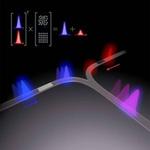Other

“In a paper published today in Nature Photonics, researchers from the University of Oxford, along with collaborators from the Universities of Muenster, Heidelberg, and Exeter, report on their development of integrated photonic-electronic hardware capable of processing three-dimensional (3D) data, substantially …

“Significantly improved electric vehicle (EV) batteries could be a step closer thanks to a new study led by University of Oxford researchers, published today in Nature. Using advanced imaging techniques, this revealed mechanisms which cause lithium metal solid-state batteries (Li-SSBs …

“For the first time, mathematicians have partnered with artificial intelligence to suggest and prove new mathematical theorems. The work was done in a collaboration between the University of Oxford, the University of Sydney in Australia and DeepMind, Google’s artificial …

“Clocks are essential building blocks of modern technology, from computers to GPS receivers. They are also essentially engines, irreversibly consuming resources in order to generate accurate ticks. But what resources have to be expended to achieve a desired accuracy? In …

“A team of international scientists has demonstrated an initial prototype of a photonic processor using tiny rays of light confined inside silicon chips that can process information much more rapidly than electronic chips and also in parallel - something traditional chips …

“Researchers at Oxford University, in collaboration with DeepMind, University of Basel and Lancaster University, have created a machine learning algorithm that interfaces with a quantum device and ‘tunes’ it faster than human experts, without any human input. They are dubbing …

“Could light be the answer to the future of more energy-efficient and faster computing? Today, our collaborative team of scientists led by Oxford and IBM Research-Zurich, with colleagues at Exeter and Munster, published a new research paper that points to …

“Solar energy is clean and abundant. But when the sun isn’t shining, you must store the energy in batteries or through a process called photocatalysis — in which solar energy is used to make fuels. In photocatalytic water splitting, sunlight …

“Artificial intelligence is changing the world and doing it at breakneck speed. The promise is that intelligent machines will be able to do every task better and more cheaply than humans. Rightly or wrongly, one industry after another is falling …

“A new computer software programme has the potential to lip-read more accurately than people and to help those with hearing loss, Oxford University researchers have found. Watch, Attend and Spell (WAS), is a new artificial intelligence (AI) software system that …

“Oxford academics are teaming up with Google DeepMind to make artificial intelligence safer. Laurent Orseau, of Google DeepMind, and Stuart Armstrong, the Alexander Tamas Fellow in Artificial Intelligence and Machine Learning at the Future of Humanity Institute at the University …

“The world’s first entirely light-based memory chip to store data permanently has been developed by material scientists at Oxford University and University of Münster in collaboration with scientists at Karlsruhe and Exeter. The device, which makes use of materials …

